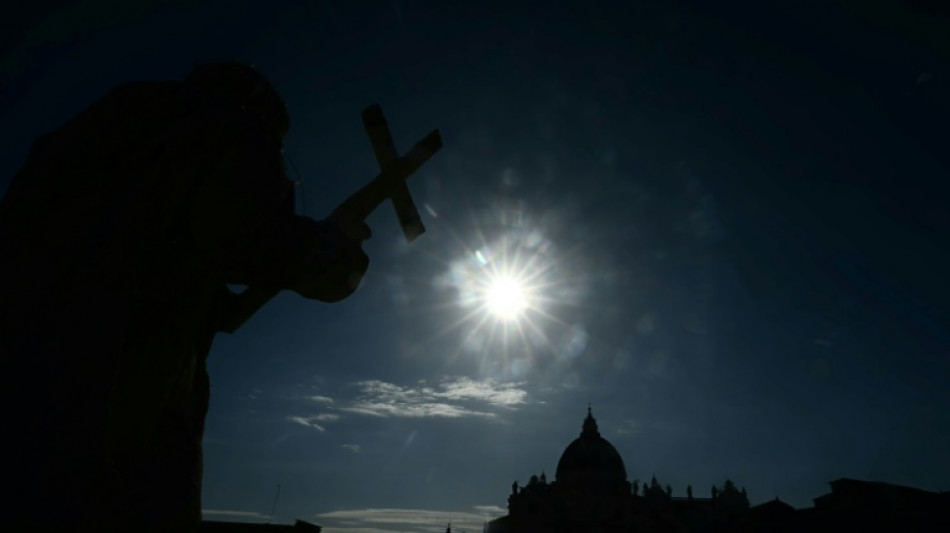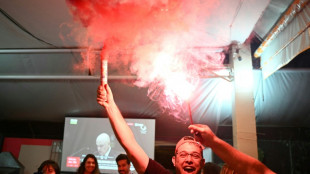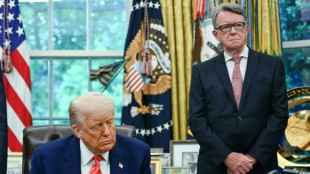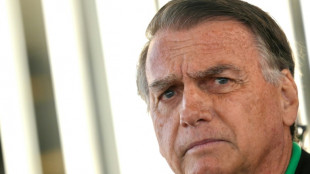
Pink smoke signals in Rome call for women priests

Excluded from the conclave to elect a new pope Wednesday -- and more broadly from the Church's entire global priesthood -- some Catholic women were determined that their voices will be heard.
In a park on a hill overlooking the dome of St Peter's and the church's Vatican headquarters, campaigners released pink smoke from flares, and demanded that women be allowed to seek ordination.
"We are saying to the cardinals, you cannot keep ignoring 50 percent of the Catholic population, you cannot go into a locked room and discuss the future of the Church without half of the Church," said Miriam Duignan.
"Whoever they elect needs to be brave enough to properly tackle the question of women's inclusion, because so far it has not been, even by Pope Francis," said Duignan, of the Wijngaards Institute in Cambridge.
Duignan was briefly detained in 2011 after she attempted to enter the Vatican to deliver a petition in support of a priest backing the activists' cause.
Had the activists taken their Wednesday protest -- a nod to the black and white smoke used by the Holy See to announce voting results -- to the Vatican, they believe a similar fate would have awaited them.
"Whenever we go down to St Peter's Square, we are detained by the police ... and we are certainly not invited to go into the conclave," Duignan said
"The only women that those 133 men will see in the next few days will be nuns who are cleaning their rooms and serving them food and tidying up after them."
The cardinals meeting Wednesday behind closed doors in the Sistine Chapel will not hear any female opinions during deliberations expected to last days, with multiple rounds of voting.
The only women they will see before white smoke rises to announce their decision has been made will be the nuns who cook, clean and serve upon them in the Santa Marta guesthouse.
In the global church as a whole, women have begun to take some senior lay roles, a process that accelerated a little under Pope Francis's papacy.
But even those who have studied theology and church ministry are excluded from the priesthood, and only priests hold the most senior leadership roles.
"Yes, Pope Francis elevated and promoted a few women into roles of responsibility, but they are always lower in status and authority than a man," said Duignan.
"Even the youngest priest in the room is the boss of the oldest, more experienced woman."
- 'A sin and a scandal' -
The campaigners say women took equal roles in worship in the early Church, before medieval reforms, and that, in Duignan's words, "the men who are going into the Sistine Chapel this afternoon know that, and they don't want everyone else to know that."
Kate McElwee, executive director of the Women's Ordination Conference campaign group, described this as an injustice and a "crisis" for the church.
"While the world may wait for white smoke or black smoke, we send up pink smoke as our hope that the Church may someday welcome women as equals," she said.
French activist Gabrielle Fidelin called it "a sin and a scandal that women are kept out of priesthood and the conclave."
According to Duignan, even after Francis's relatively reformist 12-year pontificate, only one of the 133 cardinal electors to be sequestered in conclave has taken a positive stance on women's ordination.
And she was reluctant to identify him by name, in case he found himself expelled from the gathering.
This despite the once taboo issue being given an airing in the Synod -- an assembly of clergy, clerics and laypeople -- which under Francis has included female members.
In October last year, a report was issued after Francis approved a working party to look into the idea of allowing women to become deacons -- a step before the priesthood.
It acknowledged that "the question of women's access to diaconal ministry remains open" but concluded that it was too soon to make a decision.
L.Nguyen--SFF

 London
London

 Manchester
Manchester
 Glasgow
Glasgow
 Dublin
Dublin
 Belfast
Belfast
 Washington
Washington
 Denver
Denver
 Atlanta
Atlanta
 Dallas
Dallas
 Houston Texas
Houston Texas
 New Orleans
New Orleans
 El Paso
El Paso
 Phoenix
Phoenix
 Los Angeles
Los Angeles



